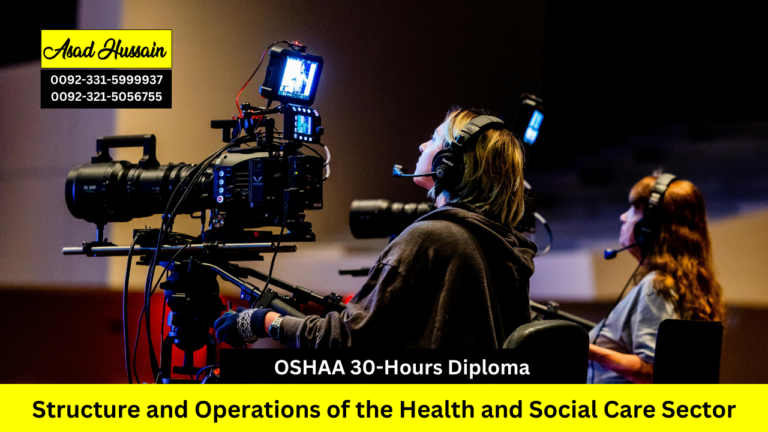The LICQual Level 6 Diploma in Healthcare Strategy and Planning is a premier qualification designed for healthcare professionals seeking to master the principles of strategic leadership, organizational planning, and operational excellence within healthcare systems. In today’s rapidly evolving healthcare landscape, the ability to develop and implement effective strategies is critical for enhancing patient outcomes, optimizing resource allocation, and achieving sustainable organizational growth. This program equips learners with advanced knowledge and practical skills to design, evaluate, and lead healthcare strategies that align with national and global standards.
LICQual Level 6 Diploma in Healthcare Strategy and Planning focuses on empowering healthcare leaders and managers to think critically and strategically, ensuring that organizational objectives are met efficiently and effectively. Learners gain insights into the principles of healthcare management, policy development, and strategic frameworks that drive decision-making processes. Through case studies and applied learning, participants explore how strategic planning directly impacts healthcare delivery, quality assurance, and patient safety initiatives.
Healthcare professionals undertaking this qualification will develop essential analytical and problem-solving skills. They will learn to assess organizational performance, identify opportunities for improvement, and implement evidence-based strategies. The program emphasizes practical applications, including resource planning, risk assessment, and policy formulation, ensuring that learners can translate theoretical knowledge into real-world solutions.
A key component of the diploma is leadership and stakeholder management in healthcare settings. Learners will gain the ability to lead multidisciplinary teams, negotiate with key stakeholders, and foster collaborative environments that support organizational goals. Strategic communication, change management, and performance evaluation are integral parts of the curriculum, preparing professionals to navigate complex healthcare challenges.
The LICQual Level 6 Diploma in Healthcare Strategy and Planning also addresses financial and operational planning, equipping learners with the skills to optimize budgets, allocate resources efficiently, and measure outcomes against strategic objectives. Emphasis is placed on aligning strategic initiatives with regulatory requirements and ethical standards, ensuring compliance and organizational accountability.
Upon completion, graduates will be fully prepared to assume senior roles in healthcare management, policy development, and organizational leadership. This qualification empowers professionals to drive innovation, enhance operational efficiency, and implement strategic plans that improve patient care and organizational performance, positioning them as leaders in the global healthcare sector.
Program Highlights
Mandatory Units
- Principles of Healthcare Strategy
- Healthcare Planning and Policy Development
- Resource Management and Operational Efficiency
- Healthcare Financial Management
- Strategic Risk Management and Innovation
- Healthcare Leadership and Organisational Development
The LICQual Level 6 Diploma in Healthcare Strategy and Planning is designed for professionals seeking to advance their expertise in strategic healthcare leadership and organizational planning. To ensure learners can fully benefit from this advanced program, certain entry requirements related to age, education, professional experience, and language proficiency are necessary. These criteria ensure participants are well-prepared to engage with complex strategic concepts and practical applications in healthcare management.
Age Requirements
• Learners must be at least 18 years old or above at the time of enrollment.
• Applicants are expected to demonstrate maturity, responsibility, and a professional attitude toward strategic healthcare management.
Educational Requirements
• A Level 5 qualification in healthcare, business administration, management, or a related field is preferred.
• Candidates with equivalent academic qualifications or recognized professional certifications may also be considered.
• Learners without formal qualifications but with substantial professional experience in healthcare management or strategic roles may be assessed on a case-by-case basis.
Professional Experience
• Ideally, learners should have at least two years of experience in healthcare leadership, administration, policy development, or organizational planning.
• Professionals currently working in hospitals, healthcare organizations, public health institutions, or regulatory bodies are encouraged to apply.
• Experience in strategic planning, resource management, or operational oversight will provide a practical foundation for applying course concepts.
English Language Proficiency
• As the program is delivered in English, learners must demonstrate proficiency in reading, writing, and communication.
• Non-native English speakers may need to provide evidence of language competence through recognized tests such as IELTS or equivalent.
• Applicants with previous study or work experience in English-speaking environments may also meet this requirement.
Learners who do not fully meet the above criteria may still be considered based on professional achievements, motivation, and commitment to strategic healthcare leadership. For those looking to build foundational knowledge before enrolling, the LICQual Level 5 Diploma in Healthcare Management is a recommended related course that offers essential insights into healthcare leadership, governance, and operational planning.
The LICQual Level 6 Diploma in Healthcare Strategy and Planning equips healthcare professionals with the advanced skills, knowledge, and practical competencies required to lead strategic initiatives, optimize resources, and improve organizational performance within healthcare systems. Upon completing this program, learners will gain measurable outcomes across multiple domains, ensuring they are capable of applying strategic principles to real-world healthcare challenges, driving innovation, and promoting sustainable healthcare management practices.
Principles of Healthcare Strategy
• Understand and apply core concepts of healthcare strategy, including mission, vision, and strategic alignment.
• Analyse internal and external factors influencing healthcare organizations using frameworks such as SWOT and PESTLE.
• Evaluate strategic models and approaches for their effectiveness in different healthcare contexts.
• Develop actionable strategic objectives that align with organizational goals and patient care priorities.
• Demonstrate the ability to assess the impact of healthcare strategy on quality, efficiency, and sustainability.
Healthcare Planning and Policy Development
• Formulate evidence-based healthcare plans that address organizational needs and population health objectives.
• Critically analyse policy frameworks and their implications on healthcare delivery and governance.
• Apply strategic planning methodologies to develop long-term and short-term healthcare objectives.
• Collaborate with stakeholders to ensure alignment between policies, operational plans, and clinical outcomes.
• Demonstrate practical skills in drafting, evaluating, and refining healthcare policies for effectiveness.
Resource Management and Operational Efficiency
• Assess the allocation and utilization of human, physical, and technological resources in healthcare settings.
• Identify inefficiencies and implement strategies to optimize operational performance and service delivery.
• Apply project management principles to coordinate resources across multiple departments.
• Monitor and evaluate the effectiveness of operational processes using key performance indicators (KPIs).
• Develop practical solutions for sustainable resource management and cost-effective healthcare delivery.
Healthcare Financial Management
• Analyse healthcare budgets, funding models, and financial reports to support strategic decision-making.
• Evaluate cost-benefit, return on investment, and financial sustainability of healthcare initiatives.
• Apply financial planning and control methods to ensure efficient resource utilization.
• Demonstrate the ability to make evidence-based financial recommendations for strategic healthcare projects.
• Integrate financial insights into operational and strategic planning for improved organizational performance.
Strategic Risk Management and Innovation
• Identify, assess, and mitigate risks that impact healthcare strategy and operational effectiveness.
• Apply risk management frameworks to anticipate and address potential organizational threats.
• Promote a culture of innovation to improve service delivery, patient outcomes, and efficiency.
• Evaluate emerging technologies and innovative practices for strategic adoption in healthcare organizations.
• Demonstrate critical thinking and problem-solving skills in managing strategic risks and opportunities.
Healthcare Leadership and Organisational Development
• Develop leadership skills to influence, motivate, and manage teams in complex healthcare environments.
• Analyse organizational structures and culture to promote effective change management and development.
• Apply strategic leadership theories to enhance team performance, collaboration, and accountability.
• Evaluate leadership approaches for their impact on organizational growth, resilience, and patient care.
• Demonstrate the ability to implement initiatives that foster sustainable organizational development and strategic success.
The LICQual Level 6 Diploma in Healthcare Strategy and Planning ensures that learners graduate with the expertise to lead healthcare organizations strategically, optimize resources, implement effective policies, and drive innovation. Graduates are prepared to assume senior leadership roles, shaping healthcare delivery and policy in alignment with global best practices and evolving healthcare needs.
The LICQual Level 6 Diploma in Healthcare Strategy and Planning is a globally recognized qualification designed for healthcare professionals seeking to master strategic leadership, policy development, and operational planning within healthcare organizations. As healthcare systems face increasing complexity, strategic management is essential for optimizing resources, improving patient care, and driving sustainable organizational growth. This program equips learners with advanced knowledge, analytical skills, and leadership capabilities to design, implement, and evaluate effective healthcare strategies, fostering innovation, efficiency, and resilience in diverse healthcare settings.
Healthcare Leaders and Managers
• Professionals currently in or aspiring to senior leadership roles within hospitals, clinics, and healthcare organizations.
• Managers responsible for developing and executing strategic plans that align with organizational goals and healthcare standards.
• Individuals seeking to enhance their ability to implement evidence-based strategies for improved operational performance.
• Leaders focused on optimizing resource allocation, workforce management, and patient care delivery through strategic planning.
• Administrators aiming to foster sustainable organizational growth and resilience through effective strategic oversight.
Healthcare Professionals and Practitioners
• Clinicians, nurses, and allied health professionals involved in implementing strategic initiatives within healthcare settings.
• Practitioners seeking to expand their understanding of healthcare planning, policy development, and organizational strategy.
• Professionals dedicated to improving patient outcomes through the application of strategic decision-making and operational efficiency.
• Learners striving to enhance their competence in integrating strategic goals with clinical governance and service delivery.
• Individuals aiming to develop practical skills for effective implementation of healthcare projects and initiatives.
Strategic Planning Officers and Analysts
• Professionals responsible for analysing healthcare trends, performance data, and operational outcomes to inform strategic decisions.
• Individuals developing policies, frameworks, and initiatives to optimize service delivery and patient satisfaction.
• Analysts tasked with evaluating organizational performance and recommending improvements aligned with strategic objectives.
• Learners specialising in risk assessment, resource allocation, and operational planning for healthcare systems.
• Leaders committed to applying analytical insights to enhance organizational effectiveness and strategic outcomes.
Policy Makers and Healthcare Administrators
• Policy makers engaged in developing and implementing healthcare policies and strategic frameworks.
• Professionals integrating evidence-based research into organizational planning and decision-making processes.
• Administrators overseeing resource management, regulatory compliance, and operational efficiency initiatives.
• Leaders focused on aligning organizational strategy with national and international healthcare standards.
• Professionals dedicated to establishing robust infrastructures that strengthen governance, innovation, and strategic impact.
Supervisors and Departmental Heads
• Supervisors ensuring departmental alignment with organizational strategic goals and operational plans.
• Departmental heads responsible for translating strategic objectives into actionable initiatives within their teams.
• Professionals developing monitoring systems to assess performance and drive continuous improvement.
• Managers conducting operational reviews to enhance efficiency, service quality, and patient-centered outcomes.
• Leaders fostering a collaborative and proactive culture to achieve strategic healthcare objectives.
Career-Focused Learners and Future Healthcare Strategy Leaders
• Individuals aspiring to build careers in healthcare management, strategic planning, and organizational development.
• Learners preparing for senior leadership positions responsible for strategic oversight, policy implementation, and innovation.
• Professionals seeking to advance in healthcare operational management, policy analysis, or consultancy roles.
• Career-driven individuals motivated to apply global best practices in healthcare strategy and governance.
• Learners aiming to become influential leaders capable of driving strategic excellence and sustainable growth in healthcare organizations.
The LICQual Level 6 Diploma in Healthcare Strategy and Planning is ideal for professionals committed to advancing strategic leadership and organizational excellence in healthcare. Graduates will acquire the expertise to develop, implement, and manage healthcare strategies that improve operational efficiency, patient outcomes, and organizational resilience. This qualification opens pathways to senior leadership, policy development, and strategic management roles, empowering professionals to shape the future of healthcare delivery on a global scale.







